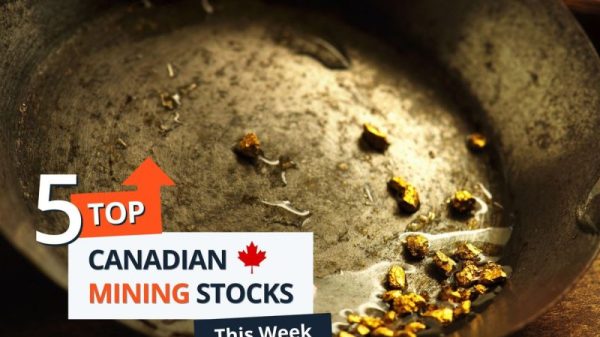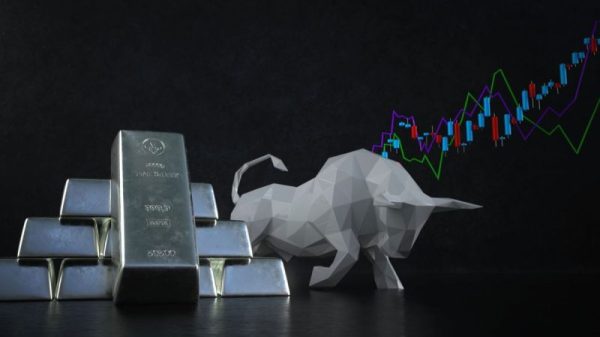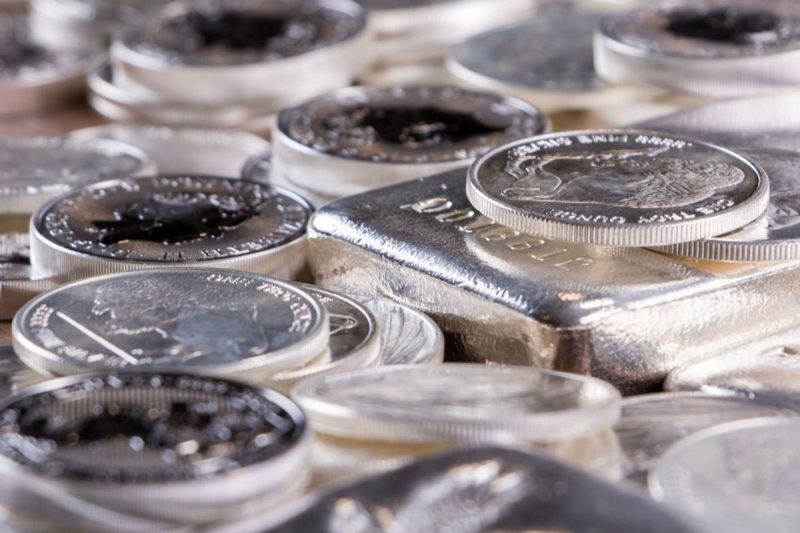2023 was a relatively lackluster year, silver largely traded on volatility between US$22 and US$25 per ounce.
The white metal started 2024 with less volatility and remained rangebound for the first eight weeks. Silver dropped to US$22.08 per ounce on January 21, marking its quarterly low.
Silver started seeing gains in March with the expectation that the US Federal Reserve was getting closer to lowering interest rates. Improving sentiment gave the precious metals markets momentum, causing silver to reach its quarterly high of US$25.62 on March 20, before continuing on to an 11 year high of US$29.26 on April 12.
How did the silver price perform in Q1?
Silver started to see gains in early March as speculation over a more dovish policy from the Fed that would see cuts beginning in June added fuel to the the gold and silver markets.
These gains were reinforced by positive language following the banks March meeting that its rate policy was continuing to progress inflation towards the central bank’s target of 2 percent.
Even though it was unwilling to commit to dates, the Fed suggested it was done with rate hikes and it was expecting to make three cuts to its benchmark rate in 2024.
Silver price, Q1 2024.
Chart via Trading Economics.
“Silver also typically lags gold, then catches up and surpasses it. We’re starting to see that happen in spades right now. Since the end of February, gold is up about 15 percent, while silver is up about 22 percent. Those are breathtaking gains in just a matter of weeks,” he said.
According to Krauth, these gains for the silver price came alongside decreasing inventories at the COMEX, London Bullion Market Association and the Shanghai Gold Exchange, where stockpiles have dropped 40 percent over the past three years.
“The same has happened to silver exchange-traded funds (ETFs) globally. My view is that large silver consumers are buying long contracts and silver ETFs, then taking delivery. That helps explain why the silver price didn’t rise in the face of ongoing deficits. But these inventories are being drained, and I think there may be 12 to 24 months left before they run out,” he said.
Even with decreasing inventories, Krauth still sees silver being held back, citing its increasing role as an industrial metal and concerns over a recession in 2024 as contributing factors to it not seeing stronger gains.
Industrial demand deepens in 2024
The thinning inventories that contributed to silver’s price gains through Q1 have come about have been driven by the white metal’s increasing demand from industrial sectors. The biggest contributing sectors have come from the energy transition, particularly the production of photovoltaics and electric vehicles.
Krauth pointed to the Silver Institute, a top industry association, which said silver is entering into a structural deficit for a fourth consecutive year in 2024, believing these shortfalls will continue for several more years.
In its latest World Silver Survey, the Silver Institute states that in 2024 demand for the white metal is forecast to reach the second highest amount on record at 1.22 billion ounces, with industrial demand set to see a 9 percent increase to 710.9 million ounces, beating out the record set in 2023 at 654.4. million ounces.
According to the Institute’s data, India has been a critical driver of demand, importing 94 million ounces of silver in the first two months of 2024, including 71 million ounces in February alone — that represents nearly an entire month of global mine production.
While the Silver Institute notes that demand for silverware and jewelry in India remains strong, it also says there is a growing industrial demand as India sees an increasing focus on infrastructure development.
To support local manufacturing, the Indian Ministry of New and Renewable Energy reimposed the Approved List of Models and Manufacturers for solar modules this past February, which limits approved solar projects in the country to use domestically produced photovoltaics.
This comes alongside the new N-type solar cells that require greater amounts of silver entering mass production in 2024.
Production relief unlikely
On the supply side, the organization is predicting a decline of 1 percent in total, with 1 billion ounces being made available. In addition, it is expecting recycled quantities of silver to remain flat at 178.9 million ounces. The biggest drop is expected to come from mine production, with an estimated total of 823.5 million ounces in 2024.
This differential suggests a widening deficit of 215.3 million ounces, a year-on-year increase of 17 percent.
Silver is primarily produced as a by-product of gold, lead, zinc and copper mines, and according to the Silver Institute these accounted for 595.2 million ounces produced in 2023. Meanwhile, primary silver mines produced just 235.2 million ounces.
With a contraction in mine output forecast for 2024 and increasing industrial demand over the next several years, the Silver Institute is projecting more tightness over the next few years, meaning limited relief on the horizon from new or existing operations.
Krauth sees two standout projects set to add millions of ounces over the next year.
“There are two major primary silver projects that stand out. Endeavour Silver (TSX:EDR,NYSE:EXK) is building its Terronera project in Mexico, which will bring about 7Moz silver equivalent per year, starting at the end of this year. Then there’s Aya Gold & Silver (TSX:AYA,OTCQX:AYASF), whose Zgounder mine in Morocco is expanding production from about 1.9Moz silver to 8Moz silver, starting with its commissioning in Q2 this year,” he said.
The Silver Institute also sees supply contributions coming from Newmont’s (TSX:NGT,NYSE:NEM) Penasquito mine, which will return to full production in 2024 following strike action in 2023, Coeur Mining’s (NYSE:CDE) expansion of its Rochester mine and the onlining of Kinross Gold’s (TSX:K,NYSE:KGC) Manh Choh project.
Even with these additions, the Silver Institute sees steep offsets, including the loss of 17.9 million ounces out of Peru as Hochschild Mining (OTCQX:HCHDF,LSE:HOC) has placed its Pallancata operation into care and maintenance as it waits for permits for its Royropata deposit.
Even when operations come online, the increases amount to tens of millions of ounces for an industry that requires hundreds of millions to overcome supply deficits.
Investor takeaway
Unlike gold, Krauth sees silver’s industrial applications holding a lot of upside, even though he believes the market hasn’t really come to terms with that, still largely viewing itas a precious metal. He also thinks the there is some opportunity for change on the horizon.
This past January, silver producers penned an open letter to the Canadian government urging the metals inclusion on the critical minerals list. While that decision won’t be known until May, if it is approved it would open up new funding options and a streamlined permitting system. Krauth thinks this would boost silver’s status among investors, and is something to watch for through the second quarter.
“I, along with the entire sector, will be watching closely to see whether silver makes the list or not. If it does, I think that would be a shot in the arm for silver. The broader investment community would pay more attention to silver’s significant structural supply shortages,” he said.
While its inclusion remains uncertain, Krauth is bullish on the white metal, but he also says he wouldn’t be surprised at a pullback this year.
More broadly, he thinks silver is in a sustained bull market and expects the price to continue to hold at US$28 and probably grow to US$30 in the second half of the year.
As silver sees upward momentum going into the next quarter, it may present new opportunities to investors looking for an alternative to gold, or taking advantage of the white metal’s increasing notoriety as an industrial metal.
Securities Disclosure: I, Dean Belder, hold no direct investment interest in any company mentioned in this article.







































